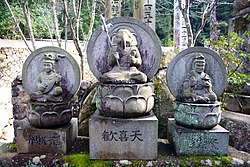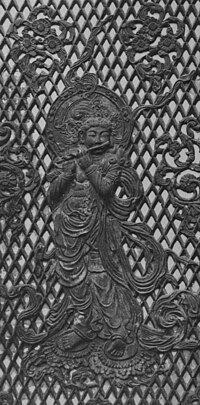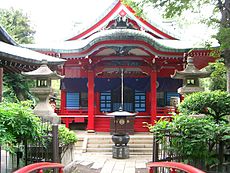This section: Diffusion of Hinduism in Japan needs additional citations for verification. (March 2024) |
 Statues of Benzaiten (Saraswati), Kangiten (Ganesh), and Bishamonten (Kubera) in the historic Daishō-in temple | |
| Total population | |
|---|---|
| Languages | |
| Liturgical: Sanskrit, Old Tamil |
| Hinduism by country |
|---|
  |
| Full list |
Hinduism is a minority religion in Japan mainly followed by the Indian, Sri Lankan and Nepali expatriate residents of Japan, who number about 166,550 people as of 2022. It's also widely integrated into the native Shinto-Buddhist religion which has had a significant impact on Japanese culture; Buddhism being an Indian religion is largely related to Hinduism, and most of its cultural practices are similar to those found in Hinduism.[1]
History
[edit]This section needs expansion. You can help by adding to it. (March 2024) |

Hinduism diffused throughout East Asia via trade routes, and also through the expansion of Buddhism in the sixth century. [2] There has also been significant transfer of Hindu-derived material native to China and South East Asia into Japan over the past two millennia.[3][4][5]
Diffusion of Hinduism in Japan
[edit]This section needs expansion. You can help by adding to it. (March 2024) |
Hindu deities have been integrated into Japanese religious culture and several deities are worshiped for good luck.[6] In fact there are many deities that are still worshiped in Japan which have long been forgotten in India.[7]
Saraswati (Benzaiten) is arguably the most revered deity in Japan after the Buddha.[8] She forms as a part of the "Seven Gods of Fortune", of which four originated as Hindu deities: Benzaitensama (Sarasvati), Bishamon (Vaiśravaṇa or Kubera), Daikokuten (Mahākāla or Shiva), and Kichijōten (Lakshmi). The last, along with Benzaitennyo (Saraswati) and the female version of Daikokuten completes the nipponized Tridevi of Great Goddesses.[9]

The Hindu god of death, Yama, is known in his Buddhist form as Enma. Garuda, the mount (vahana) of Vishnu, is known as the Karura (迦楼羅), an enormous, fire-breathing creature in Japan. It has the body of a human and the face or beak of an eagle. Tennin originated from the apsaras.[citation needed]
Ganesha (or Kangiten) is prayed to for health, success and good fortune. Many Japanese Buddhist deities (or Tenbu) have their roots in Hinduism and are still revered by many Japanese particularly in Shingon Buddhism.[citation needed]
Other examples of Hindu influence on Japan include the belief of "six schools" or "six doctrines" as well as use of yoga and pagodas.[citation needed]
People have written books on the worship of Hindu gods in Japan.[10] Even today, it is claimed Japan encourages a deeper study of Hindu Gods.[11]
List of Hindu gods in Japanese culture
[edit]| English | Japanese | Thai-Brahmi | Devanagari-Sanskrit |
|---|---|---|---|
| Agni | 火天 | พระอัคนี | अग्नि |
| Ganesh | 歓喜天 | พระพิฆเนศวร | गणेश |
| Garuda | 迦楼羅 | ครุฑ | गरुड़ |
| Lakshmi | 吉祥天 | พระลักษมี | लक्ष्मी |
| Virupak | 広目天 | ท้าววิรูปักษ์ | विरूपाक्ष |
| Prithvi | 地天 | พระปฤถวี | पृथ्वी |
| Varuna | 水天 | พระพิรุณ | वरुण |
| Viruthak | 増長天 | ท้าววิรุฬหก | विरूढक |
| Dakini | 荼枳尼天 | ฑากิณี | डाकिणी |
| Mahakala | 大黑天 | มหากาฬ | महाकाल |
| Apsara | 天人 | อัปสร | अप्सरा |
| Sakr | 帝釈天 | ท้าวสักกะ | शक्र |
| Surya | 日天 | พระอาทิตย์ | सूर्य |
| Brahma | 梵天 | พระพรหม | ब्रह्मा |
| Vaishravana | 毘沙門天 | ท้าวเวสวัณ | वैश्रवण |
| Saraswati | 弁才天 | พระสุรัสวดี | सरस्वती |
| Vayu | 風天 | พระพาย | वायु |
| Rahu | 羅睺 | พระราหู | राहु |
| Rakshassa | 羅刹天 | รากษส | राक्षस |
| Ishana | 伊舎那天 | พระอีศาน | ईशान |
| Skanda | 韋駄天 | พระเวทโพธิสัตว์ | स्कन्द |
| Yama | 閻魔天 | พระยม | यम |
Present situation
[edit]Hinduism is practiced mainly by the Nepali, Indian and Sri Lankan migrants, although there are others. As of 2022, there are 40,917 Sri Lankans, 40,752 Indians and 125,798 Nepalis in Japan.[13][14]
The few Hindu temples in Japan are as follows:
- Shirdi Saibaba Temple, Tokyo
- ISKCON New Gaya, Tokyo
- ISKCON Osaka Center, Osaka
- Vedanta Society of Japan, Kanagawa
- BAPS Shri Swaminarayan Mandir, Tokyo
- Shiva Shakti Mandir, Tokyo
The Association of Religion Data Archives estimated that 24,182 Hindus in Japan as of 2020.[15]
References
[edit]- ^ "Buddhism and Hinduism". obo. Retrieved 2024-03-28.
- ^ Acharya, Amitav. "Journey to the East: The Hindu-Buddhist Making of Southeast Asia". thediplomat.com. Retrieved 2024-03-17.
- ^ Pant, Don McLain Gill & Harsh V. (2023-11-21). "India and Japan Converge in Southeast Asia". The Hindu. ISSN 0971-751X. Retrieved 2024-03-17.
- ^ "Southeast Asia: History and Culture – Japan society for Southeast Asian Studies". Retrieved 2024-03-17.
- ^ "Southeast Asia and Japan: Linked by Ties of Cultural Exchange". The Government of Japan - JapanGov -. Retrieved 2024-03-17.
- ^ "Japan's Hindu Linkages Still Alive". hwpi.harvard.edu. Retrieved 2024-03-17.
- ^ "Hindu deities in Japan". Frontline. 2015-09-16. Retrieved 2024-03-17.
- ^ "'Saraswati is the most revered deity in Japan, after the Buddha': Filmmaker Benoy Behl". The Indian Express. 2019-05-11. Retrieved 2024-03-17.
- ^ "Butsuzōzui (Illustrated Compendium of Buddhist Images)" (in Japanese). Ehime University Library. 1796. p. (059.jpg). Archived from the original (digital photos) on 2018-10-10. Retrieved 2016-04-28.
- ^ Chaudhuri, Saroj Kumar. Hindu Gods and Goddesses in Japan. (New Delhi, 2003) ISBN 81-7936-009-1.
- ^ Mohapatra, Satyen (2023-09-03). "Japan Wants to Encourage Studies of Hindu Gods". The Pluralism Project, Harvard University.
- ^ "Hindu Contributions to Japanese Religion" (PDF). Hindu Education. Archived from the original on 2006-10-21. Retrieved May 14, 2020.
{{cite web}}: CS1 maint: bot: original URL status unknown (link) - ^ Ministry of Justice Statistics
- ^ "データセット一覧". e-stat (in Japanese). Retrieved 6 March 2023.
- ^ "Japan, Religion And Social Profile". thearda.com. Retrieved 2023-06-04.
Notes
[edit]- ^ オーム (U+30AA & U+30FC & U+30E0)